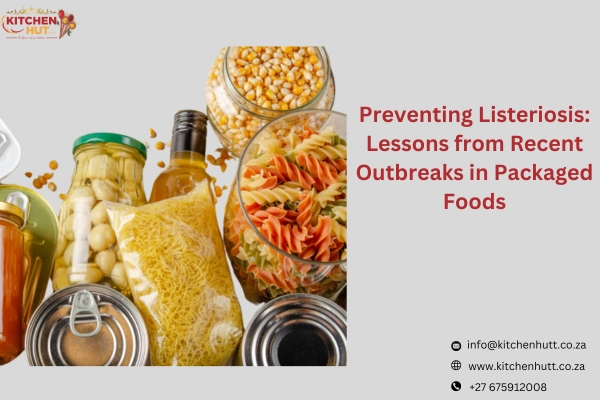Freshly Packed • Quality Assured • Reliable Delivery
Preventing Listeriosis: Lessons from Recent Outbreaks in Packaged Foods

Listeriosis, a potentially deadly infection caused by the bacterium Listeria monocytogenes, has emerged as a significant public health concern, particularly about packaged foods. While many consumers assume that packaged foods, especially those labeled as ready-to-eat, are safe, recent outbreaks have highlighted the vulnerability of these products to contamination. This article delves into the lessons learned from recent Listeriosis outbreaks in packaged foods and what steps can be taken to prevent future incidents.
Understanding Listeriosis
Listeriosis is a serious infection that primarily affects pregnant women, newborns, elderly individuals, and those with weakened immune systems. The symptoms of Listeriosis can range from mild flu-like symptoms to severe complications such as meningitis, septicemia, and death. Listeria monocytogenes is particularly dangerous because it can survive and even thrive at refrigeration temperatures, making it a formidable threat in cold-stored, ready-to-eat foods.
Recent Outbreaks and Their Impact
In the past decade, several high-profile outbreaks of Listeriosis have been traced back to packaged foods, including ready-to-eat salads, deli meats, cheeses, and frozen vegetables. These outbreaks have resulted in numerous illnesses, hospitalizations, and deaths, prompting massive recalls and significant public concern.
For instance, in 2015-2016, a major outbreak of Listeriosis in the United States was linked to prepackaged salads produced by a large food company. The outbreak led to multiple deaths and hospitalizations across several states, and the subsequent recall involved millions of products. Similarly, in 2017, a Listeriosis outbreak linked to frozen vegetables in Europe led to widespread recalls and heightened scrutiny of food safety practices in the frozen food industry.
These incidents have not only caused widespread public health scares but have also resulted in significant financial losses for the companies involved and shaken consumer confidence in packaged foods. The recurring nature of these outbreaks underscores the need for improved food safety practices and more rigorous oversight across the entire supply chain. Herbs and spices are included in this food.
Lessons Learned from Recent Outbreaks
The recent outbreaks of Listeriosis in packaged foods have provided valuable lessons for both the food industry and consumers. By analyzing these events, we can identify critical areas where food safety practices need to be strengthened to prevent future outbreaks.
-
Enhanced Sanitation and Environmental Monitoring: One of the most significant lessons from recent outbreaks is the importance of maintaining strict sanitation protocols in food processing facilities. Listeria can persist in the environment, particularly in areas that are difficult to clean, such as drains, equipment crevices, and refrigeration units. Regular and thorough cleaning, coupled with environmental monitoring, can help detect Listeria early and prevent it from contaminating food products. The implementation of rigorous sanitation protocols and the use of advanced cleaning technologies are essential for minimizing the risk of contamination.
-
Improved Cold Chain Management: The ability of Listeria to grow at low temperatures makes proper cold chain management critical. Recent outbreaks have highlighted the need for continuous monitoring of temperature during storage and transportation. Any deviations from the optimal temperature range can allow Listeria to proliferate, increasing the risk of contamination. Food companies must invest in reliable temperature monitoring systems and ensure that all parts of the supply chain adhere to strict temperature control standards.
-
Comprehensive Testing and Traceability: Another crucial lesson from recent Listeriosis outbreaks is the need for comprehensive testing and traceability systems. Routine testing of both the environment and food products can help identify contamination early, allowing for timely interventions. Additionally, traceability systems that track products from farm to fork are vital for quickly identifying and recalling contaminated products. These systems not only protect consumers but also minimize the financial and reputational damage to companies in the event of an outbreak.
-
Consumer Education and Awareness: While much of the responsibility for preventing Listeriosis lies with food producers and regulatory agencies, consumers also play a role in minimizing their risk. Recent outbreaks have underscored the importance of consumer education and awareness. Consumers should be informed about the risks associated with certain packaged foods, particularly those that are ready-to-eat. They should also be educated on proper food storage practices, such as keeping refrigeration units at the correct temperature, adhering to expiration dates, and avoiding cross-contamination.
-
Regulatory Oversight and Collaboration: The recent outbreaks have highlighted the need for stronger regulatory oversight and collaboration between governments, food producers, and public health organizations. Regulatory agencies must enforce stringent food safety standards and conduct regular inspections of food processing facilities. Collaboration between industry and government is essential for sharing information on best practices, emerging risks, and effective prevention strategies. Public health organizations also play a crucial role in monitoring outbreaks and issuing timely alerts to protect consumers.
Steps to Prevent Future Outbreaks
Preventing future Listeriosis outbreaks in packaged foods requires a concerted effort from all stakeholders in the food supply chain. Food companies must invest in improved sanitation, cold chain management, testing, and traceability systems. Regulatory agencies must enforce strict food safety standards and promote collaboration across the industry. Consumers must be educated on the risks and take steps to store and handle food safely.
Moreover, innovation in food safety technologies, such as advanced pathogen detection methods, better refrigeration systems, and automated traceability solutions, can further enhance our ability to prevent Listeriosis. Continuous research and development in these areas will be key to staying ahead of emerging risks and ensuring that packaged foods remain safe for consumers.
Conclusion
The recent Listeriosis outbreaks linked to packaged foods have highlighted significant vulnerabilities in our food safety systems. However, by learning from these incidents and implementing stronger prevention strategies, we can reduce the risk of future outbreaks and protect public health. The prevention of Listeriosis is a shared responsibility that requires vigilance, innovation, and collaboration across the entire food supply chain.












